
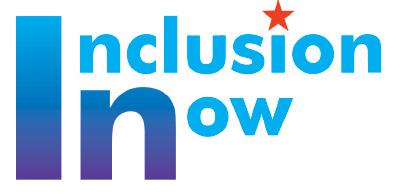
Summer 2023 Issue 66 £2 A VOICE FOR THE INCLUSION MOVEMENT IN THE UK A VOICE FOR THE INCLUSION MOVEMENT IN THE UK School Visit : Monega Primary ‘Inclusion is our core value’ p3 SEND Improvement Plan: parent view Sharon Smith, p7 Newham inclusion Linda Jordan p 9 Legal Question School exclusions p25 Ofsted undermines inclusion Melody Powell, p20 Inclusive Solutions Inclusion in practice p 15 UNCRPD & Intersectionality Maresa Mackeith, p22
A voice for the UK inclusion
Welcome to Inclusion Now 66, with inclusive education news for summer 2023. Opening this edition, Richard Rieser reports back on his visit to Monega Primary School in the London Borough of Newham, “a shining example of how inclusion can become a reality in schools. If the Government were to learn from Monega’s inclusive practice, they would put inclusive values and practice at the heart of their SEND Plan of Action.” (Page 3)
The Government’s current action plan side-lines discussion about mainstream education for Disabled people and meets more extreme expectations we had about the emphasis on segregation. In Sharon Smith’s article (page 7) on the SEND Improvement plan, she argues and the ‘apparent’ shift to inclusion, is not a real shift at all, from a parent’s perspective.
On a local level, ALLFIE and others are campaigning on a local government level for greater inclusion strategy and policy in Local Authorities. On page 9, Linda Jordan discusses inclusion in the London Borough of Newham, how it began - a retrospective.
Melody
Inclusion Now occasionally includes adverts for products, services or events offered by other organisations. This doesn't imply we endorse the products or services. Readers are advised to check details and make their own judgements. Inclusion Now provides an opportunity for information exchange. All views expressed are not necessarily the views of ALLFIE, Inclusive Solutions or World of Inclusion. We reserve the right to edit articles. Inclusion Now is also available in audio or text Search past issues online

Cover image: Pupils at Monega Primary School in the London Borough of Newham
On page 15 we hear from Inclusive Solutions, as magazine partners Colin and Derek join Maresa Mackeith for a Q&A about their inclusive practices.
Inclusive schools, like Melody Powell’s previous one, are downgraded because they don’t meet Ofsted tick boxes. Melody and ALLFIE's Michelle Daley, highlight school intake discrimination (page 20).
Maresa and Michelle look at intersectional approaches to inclusive education under the UN Convention on the Rights of Persons with Disabilities (Page 22). Maresa’s own experience highlights what the UNCRPD is calling for and why we need Article 24 implemented in law, to achieve mainstream inclusive education as a right for all in the UK.
UK Disability History Month have launched a creative exploration for Young Disabled people. Richard Rieser explains how to enter (page 24).
Rounding up, in the Legal Question ALLFIE's Navin Kikabhai and Victoria Higgins, Simpson Millar, tackle school exclusions (Page 25).
By Catherine Bebbington ALLFIE Communications Officer
2 Contents 3 School visit: Monega Primary Richard Rieser, World of Inclusion 7 SEND and Alternative Provision Improvement Plan: Right Kind of Pupil, Right Place, Right Price. Sharon Smith, Parent & Researcher 9 Inclusive Education in Newham Interview with Linda Jordan 15 Inclusive Solutions: “Don’t defend inclusion, make them defend segregation”
with Maresa MacKeith 20 Ofsted emphasis on ‘improving’ school standards undermines inclusion
Q&A
Powell &
22 Intersectional approaches to inclusive education under UNCRPD Maresa MacKeith & Michelle Daley 24 A Creative Exploration for Young Disabled People across the UK. UK Disability History Month
Legal Question: School exclusions
Michelle Daley
25
Editorial
Navin Kikabhai & Victoria Higgins
movement
Monega Primary: ‘Inclusion is our core value’
 By Richard Rieser,
By Richard Rieser,
World of Inclusion

In May this year, Richard Rieser visited Monega Primary School in the London Borough of Newham. The school’s vision and ethos statements is: ‘A happy, inclusive, caring school, where every child matters’. Our approach encourages all children to be enthusiastic lifelong learners.’
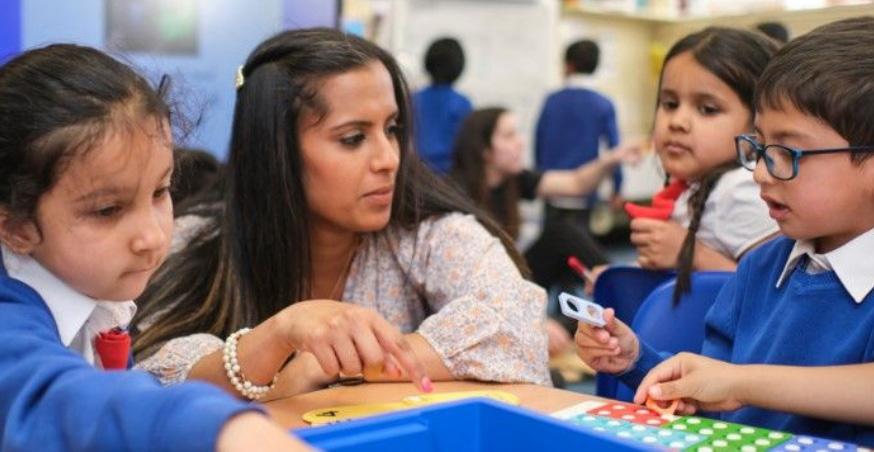
Monega Primary school is housed in an old School Board, triple decker, brick-built school from the 1900s. Located in Manor Park, Newham, it serves a diverse catchment area, with 40 languages spoken. Monega has 700 children in three forms per year group and two nursery classes. The school has 42 pupils with complex needs and 70 pupils on the SEN register. In the four years since joining Boleyn Academy Trust, Monega, which is committed to providing an inclusive, high-quality education for all, has moved from being classed inadequate (in 2017) to outstanding (in 2022) by OFSTED.
Katie Ives, the SENCO and the assistant head teacher, who learned her craft as an inclusive educator at Tollgate School (See issue 50 Summer 2018 for an article on the school), explains why Monega’s commitment to pupils with SEND is a highly successful aspect of work across the school:
“All on SEND Register have Individual Education Plans with half-termly targets. All of them have a personalised package of support delivered in the mainstream classes with withdrawal kept to a minimum.”
3 School visit
Image: Puplis learning at Monega Primary School in the London Borough of Newham
School visit
Complex needs include Down syndrome, autism spectrum, global development delay and speech and language needs. They have differentiated work and peer support is strongly encouraged. A buddy system operates at break and lunchtime. There is no bullying towards Disabled pupils. They start with their peer group in nursery or reception and go up the school together and the non-disabled children, especially the girls, are very loyal and protective to their Disabled peers.

Katie stated that COVID-19 had a minimal impact on the education of pupils with SEND. All pupils in receipt of Education Health and Care Plans (EHCPs) were invited into school every day, as well as keyworker’s children, which included school staff. All children in the school take part in shows and performances and go on residential trips, where their parents agree. One innovation is a school camp where each year group, for one night, camps (usually a Thursday term time night) in tents in the school hall, and then have campfires in the playground to toast marshmallows.
The school has a family support worker and a coordinator for medical needs, all of which build strong links with parents and the local community. I witnessed a pre-reception session for those joining reception in the autumn, who are not in the two nursery classes, where staff were getting to know the children and their parents, and the children were undertaking a variety of exciting activities.
All children make progress, whatever their starting point, with a great team of teaching and support assistants who meet every day with the class teacher, before school for 10 minutes
and after school for 30 minutes. This ensures that the Quality First Teaching is adapted to the needs of all learners. To back this up, in the Intervention Room (a support/small group room) are cupboards of differentiated learning materials often visual, collected and compiled by the SENCO. These are customised by each class teacher and their team and then added back in the resource cupboards.
Given the number of pupils with autism, behaviour could be a big issue, but all staff are trained to deal with dysregulated behaviour with a range of strategies. These include fidget toys and differentiated behaviour approaches.

The Pupil Premium allow for pupils to be timetabled for Cantonese, which children labelled with complex needs can access. Two physical education (PE) instructors run extra sessions for pupils labelled with complex needs, SEND PE, three mornings a week to develop their skills and deliver their occupational therapy targets. They then also take part in PE with their whole class and, additionally, this team run art interventions.
All teachers are expected to teach all children in their class. The school provides regular training every Monday evening and subject lead teachers can attend training at the Boleyn Hub, with teachers from eight other schools, to share and develop practice. The SENCO and the SEND team ensure that all pupils have targets, materials and curriculum materials adapted to their levels.

The head teacher, Elizabeth Harris, is an Autism Spectrum Condition (ASC) specialist. Along the SENCO, they have developed very useful

4
pathways for pupils labelled with complex needs, with a pupil profile and a learning profile, which includes sensory learning, word learning, sentence learning and story level learning. From this level, a schema for the bottom 20%, based on attention, memory, language, processing, organisation, and independent learning tasks ensures waves of intervention, not just for those with SEND but also those with English as an additional language. The Pupil Premium allows for many of these interventions. This results in much better progress in learning for this cohort than for the average.
Monega uses MAPP (Mapping and Assessing Personal Progress), to supplement the statutory pre-key stage standard assessment tools in reading, writing and maths, to ensure a full breadth of coverage of personalised progress. The system assesses four aspects of skill using a 10-point scale across the whole curriculum. The four areas are: independence, fluency, maintenance, and generalisation. This system gives all educators a snapshot of where children with complex needs are, in all areas of their learning, as they progress to National Curriculum levels and focus on developing skills in what they are interested in.
Head teacher, Ms Elizabeth Harris says about the school:

“Monega Primary School is a welcoming and happy school, where everyone is caring, considerate and respectful of each other. The children are very polite, work very hard and are committed to their learning. Safeguarding is given the highest priority and we work in partnership with parents and carers. We very

much value the support and contribution that parents and carers make to school life. The strong cooperation across home and school means that we can reinforce the highest expectations.
We have carefully designed our curriculum to be progressive, ensuring pupils have a rich, relevant, broad and balanced education which is in line with the National Curriculum. Our aim is that all pupils will find passions, strengths and interests in both subjects and learning techniques that will prepare them well for future learning.

We teach subjects discreetly to ensure that all subjects have value and important knowledge is acquired and embedded. Our pupils are provided with rich opportunities to ensure that they are excited about their learning and challenged to achieve their very best.
Enrichment is a very important aspect of learning at Monega. All areas of the curriculum have enrichment opportunities that include visits to museums, theatres, exhibitions, festivals, and residential visits. We work collaboratively with community organisations to provide opportunities in dance, drama, and arts. Our musician in residence ensures that music composition, performance and singing are an important part of school life.
We offer a large selection of after school clubs, including booster and tuition sessions to ensure that all children meet their full potential.
At Monega, we are very fortunate to have such a dedicated team of teachers, teaching assistants and other staff members who strive to ensure

5 School visit
that every child is successful, confident, and responsible. The school standards are above average and the quality of teaching across the school is excellent. Strong outcomes in pupils’ books, pupil and parent voice and our academic achievement demonstrate the impact of our approach.”
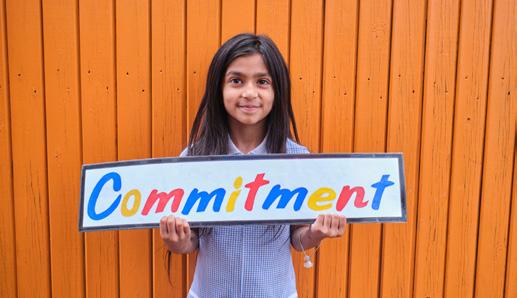
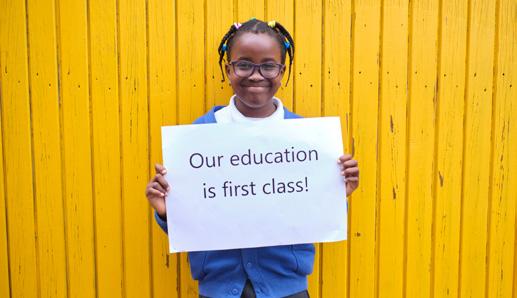

Asked to consider whether high quality mainstream provision can exist alongside inclusive provision, Ms Harris replies that, in her experience, that is a yes. Out of eight inclusive schools in the Boleyn Trust, five are rated outstanding and three are rated good by Ofsted.
Performance is above the national average and local performance. They have high expectations for everyone. They have good support for teachers to differentiate well, and good levels of intervention to enable children to meet their potential.


Conclusion
Monega Primary school is a shining example of how inclusion can become a reality in many more schools. If the government were to learn from Monega’s inclusive practice, they would put inclusive values and practice at the heart of their SEND Plan of Action.
6 School visit
SEND and Alternative Provision Improvement Plan: Right Kind of Pupil, Right Place, Right Price.
 By Sharon Smith, Parent and PhD researcher
By Sharon Smith, Parent and PhD researcher
“We believe the most vulnerable children deserve the very highest quality of care. We will improve diagnostic assessment for schoolchildren, prevent the unnecessary closure of special schools, and remove the bias towards inclusion.” (Cabinet
Office, 2010)
In 2010, David Cameron set out an intention to ‘end the bias towards inclusive education’ in the Conservative Party manifesto for the forthcoming general election. Following the election, the coalition government adopted this aim, as seen in the quote above. Professor Katherine Runswick-Cole (Sheffield University) described at the time how this was an attempt to ‘re-narrate the special education agenda’ by implying that there had previously been a ‘bias towards inclusion’, which would be addressed ‘by putting forward a “reasonable and sensible” solution to what is seen by some to be the “problem of inclusion”’. She argued, in the British Journal of Special Education 2011, that:
“Although there may have been an inclusive education policy rhetoric, this rhetoric is rooted in conceptual incongruities which, rather than promoting inclusion, undermine an inclusive approach to education”. (Runswick-Cole, K. 2011: Time to end the bias towards inclusive education?)
In reality, there never had been a meaningful bias towards inclusion.
Fast toward to 2023, and inclusion is a hot topic within the government’s recently published SEND & Alternative Provision Improvement Plan: Right support, Right place, Right time. According to the introduction, this plan, alongside the Schools White Paper, sets out ‘bold proposals to deliver a generational change for a more inclusive system’ (page 3). Not only does it set out proposals for a more inclusive education
system, but the aim is to use this system to create a more inclusive society too (page 7).

At the heart of the government’s plan is new ‘National Standards’, which will ‘set out clear expectations for the types of support that should be ordinarily available in mainstream settings’ (page 5).
Alongside these National Standards, each local area will be required to ‘create evidence-based local inclusion plans that will set out how the needs of children and Young people in the local area will be met’ and which will be used to ‘provide a tailored list of suitable settings’ for children, Young people and their parents to choose from (page 10). They also plan to ‘publish a local and national inclusion dashboard’ which will give greater transparency of local performance, inform decision-making and apparently drive 'self-improvement across the system with ongoing updates and iterations in response to user feedback’ (page 12). The role of alternative provision is clarified, to ensure it is seen as a temporary solution offering preventative work and reintegration back into mainstream schools (page 13). And finally, best practice from areas that have inclusive provision will be shared more widely (page 13). Does this mean that there is a renewed (or new?!) bias towards inclusion taking place here? Sadly, I do not think so. I think that the only thing we are seeing is an increase in education policy rhetoric, with no meaningful commitment to inclusion evident anywhere.
7 Parent voice
The SEND and Alternative Provision Implementation Plan is designed to have three main goals – fulfilling children’s potential, building parental trust, and providing financial stability. It appears that it is the latter that is the key driver of the newfound focus on ‘inclusion – the need to find cheaper ways to educate children and Young people who are identified as having Special Educational Needs. You see, the Implementation Plan does not discuss ‘inclusive schools’, but rather the hope is to develop an ‘inclusive system’. Instead of providing details about what an ‘inclusive school’ or ‘inclusive education’ might look like in practice, this plan sets out what it believes an ‘inclusive system’ looks like. And embedded within that inclusive system remains a strong commitment to specialist provision, including funding for new special free schools over and above the 49 new special free schools already in the pipeline.
“An inclusive system also depends upon improved access to timely, high-quality specialist provision, where this is appropriate for the child or young person, so that every child and young person has access to the resources, information and opportunities that enable them to thrive and feel a strong sense of belonging” (page 22-3).

The concern seems to be about ensuring that the ‘right kind of pupil’ is educated in the ‘right place’ at the ‘right price’. There continues to be some pupils who are deemed to have needs that can only be met through specialist settings; the new improved ‘inclusive system’ will ensure that they are the ones who get access to specialist places, rather than places – apparently – going to those children whose parents are armed with knowledge of the law and whose pockets are deep enough to pay for solicitors to support complex SEND Tribunal appeals. There is no desire to end the current segregated system, simply the intention is to provide greater financial stability by controlling which pupils are the ‘right’ ones to be educated separately. Everyone else will need to have their ‘needs’ met in mainstream settings, through ‘quality first teaching and evidence-
based SEN Support’ – yet there is absolutely nothing in the improvement plan that suggests how mainstream schools will become more inclusive, or how these children’s experiences of education will be improved. There is no increase in investment for mainstream settings, instead it appears that the National Standards will be doing the heavy lifting here, along with three ‘practice guides’, which will provide advice to mainstream settings (page 9).

Instead of any sense of reform, this feels like a game of musical chairs. My concern is that the National Standards and the tailored list of settings will result in some children being pushed into specialist settings who do not necessarily want to be there. The National Standards and the local inclusion plans will be used to determine who belongs where, rather than being used as an opportunity to transform local schools to become places where all children and Young people have the resources, information and opportunities that enable them to thrive and feel a strong sense of belonging. It feels like a missed opportunity, and it most definitely is not an ideological shift away from specialist education playing a significant and fundamental role in the government’s vision for education.
 By Sharon Smith
By Sharon Smith
8
Parent voice
How Inclusive Education Developed in Newham
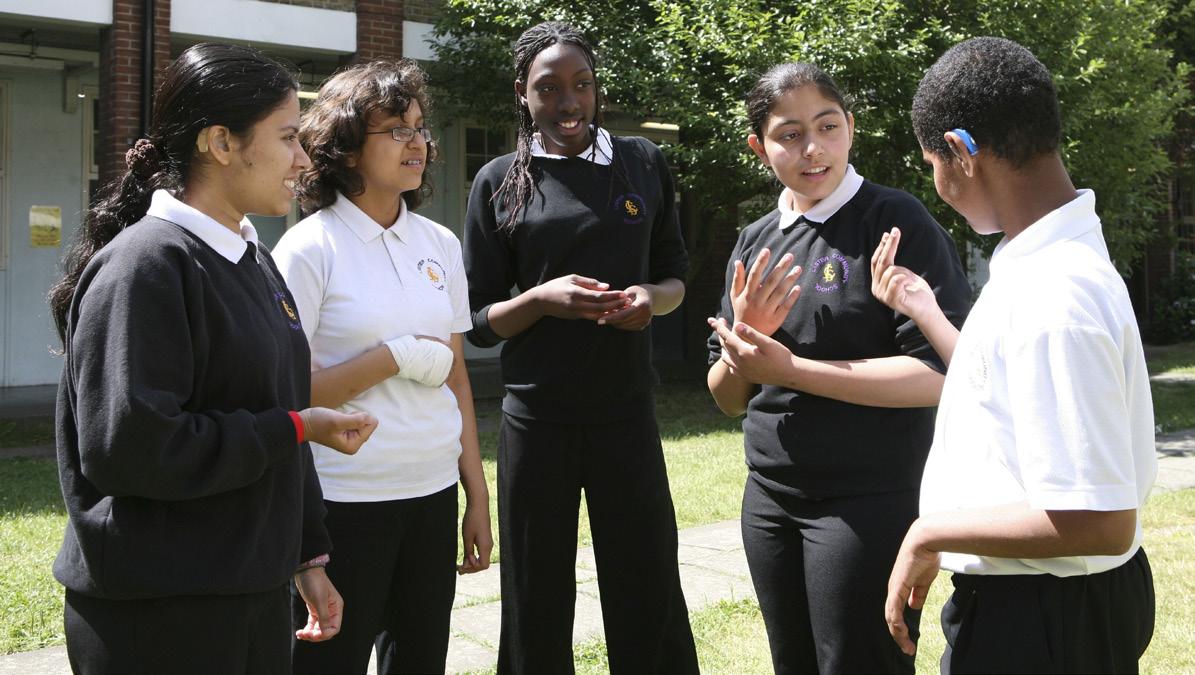

The following is an interview with Linda Jordan, Teacher and Parent, conducted by Richard Rieser.
Q1. Richard Rieser (RR): Tell us, Linda, about yourself and when you had a Disabled daughter?

Linda Jordan (LJ):
I have lived in Newham most of my life. When my first child, Ellen, was born in 1982 I was working as a secondary school teacher. It was immediately obvious that Ellen had been born into a society which thinks disability is a problem. Her arrival was shrouded in ambiguity. Me and Ellen’s Dad wanted a baby and were not concerned that she had Down’s syndrome. We had been involved in campaigns for peace and justice for many years and believe passionately that all human beings are equally valuable and should be equally valued.
I was immediately confronted by professionals who didn’t know what to do, who were scared to look at me. I found myself having to explain to them that their attitudes were wrong, and that Ellen would have an ordinary life.
9 Interview
A few years before Ellen was born, at university, May Warnock, my philosophy tutor, had recently chaired a government committee of inquiry into the education of Disabled children. I learned from Mary that large numbers of Disabled children were still in segregated education. Mary shared that this had been one of the most controversial issues she had ever been asked to examine, mainly due to vested interests. I was shocked. I had been out of the education system for nearly fifteen years and had no idea that Disabled children had a separate education. When I started teaching, I wanted to be a teacher of all children.
Soon after Ellen’s arrival, I met Anna, Laura’s Mum (another Disableed child). Anna explained that there was a new law that meant our children would go to their local schools. I discovered that the Warnock Report had led to this legislation.
Newham Parent’s Centre hosted several programmes focused on equality in education. They set up the Parent Support Network, which attracted many parents who wanted inclusive education. The parents made a pact that our children would go to mainstream schools, and we would support each other.

We met the Chair of the Education Committee who responded positively. A working party was set up with five parents invited to join, alongside Council officers, heads and teacher representatives. We began meeting in 1984 with those of us who wanted to end segregation and those who didn’t. For eighteen months we had difficult meetings. A special school head teacher publicly characterised me as an ‘extremely dangerous woman, who did not like having a disabled child’.
The outcome of the working party was a minority report signed by the parents and a teacher and a majority report.

Q2. RR: What happened to these two reports?
LJ:
The reports went to the Education Committee for consideration and the Chair asked for a report based on a consensus. The local Labour Party was preparing for the 1986 council elections. My local branch suggested that I should stand for election to provide the leadership required to develop inclusive education. I was elected in May 1986, determined to implement the manifesto commitment to inclusive education.
At the first Labour Group meeting I presented a one-page motion which included:
“Newham Council believes that segregated special education is a major factor in the discrimination and prejudice faced by disabled people. We believe that de-segregating special education is the first step in tackling this prejudice. Disabled people have been omitted from previous equality initiatives and it is now obvious that our aim of achieving comprehensive education will remain hindered while we continue to select 2% of children for separate education… It is also the right of children without disabilities to learn that people are not the same and those who happen to have a disability should not be treated differently, any more than they would if they were from a different ethnic background”.
This was passed unanimously.
10
Interview


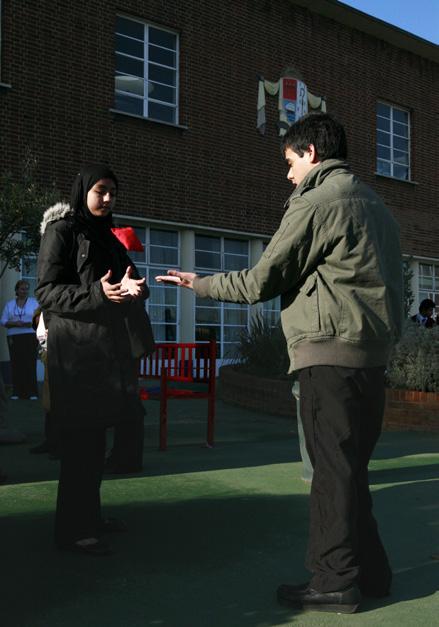
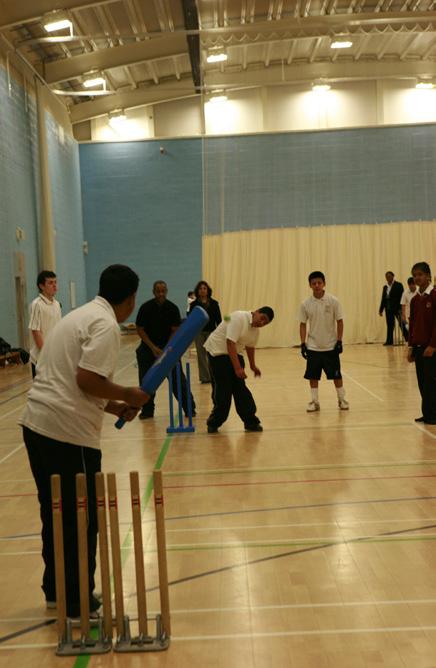
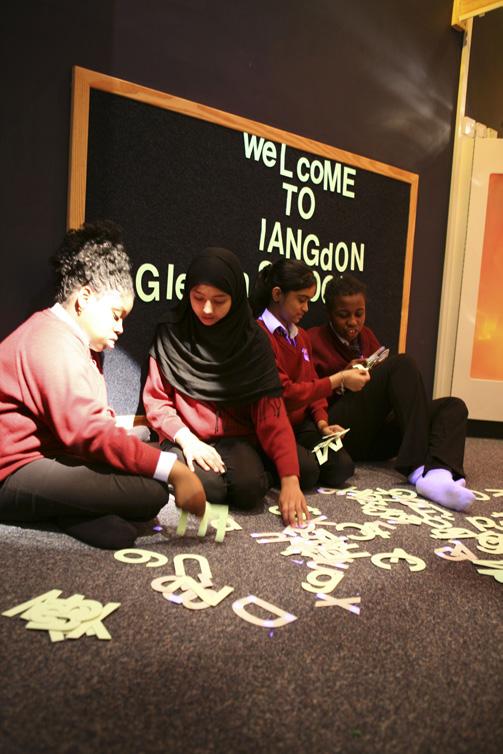
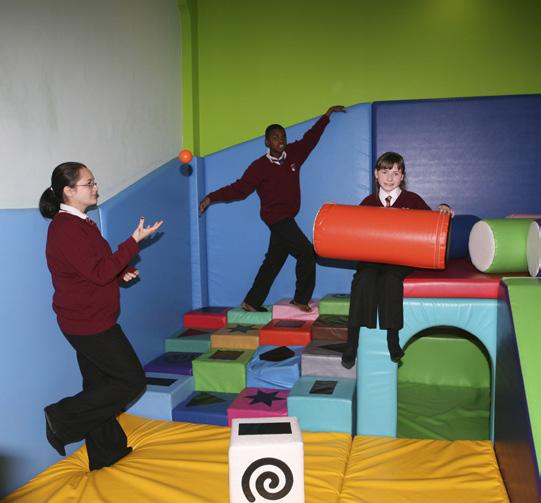
11 Interview
Images: Puplis at Monega Primary School in the London Borough of Newham
Q3. RR: That’s amazing. So that was in 1986? LJ:
Yes. Several councillors were very supportive of the special schools and were quite rightly concerned about what would happen. People were nervous. This was a big deal, and it was hard to imagine how it could work. I guaranteed we would do nothing that would have a detrimental impact on children and that we would work with parents. People were reassured. A report went to the Council, and it was agreed a steering group would oversee implementation. First steps were for children from 1987 to start at their local nursery and be supported by a newly created learning support service. The new service was led by a teacher from one of the special schools. Chris was amazing. She had so much experience and was completely committed to inclusion. The climate in Newham was ready for inclusion.
We met the education unions. As Chair of the Education Committee, I wanted a partnership with the unions. I wasn’t deeply involved in the detail of this, but I delegated to my officers and the Union Reps to come up with a policy to protect jobs while we restructured. The sensible agreement was made. It just said there would be no compulsory redundancies, that every staff member who wanted to, would be able to keep within the system and they’d be trained. It was a genuine agreement that both sides were happy with.
As more children attended their local schools, it was obvious that special schools would close at some stage. The first school to close was for children with behaviour difficulties. Very few children were attending, the head teacher was off sick, and nobody was happy. The statutory consultation with parents and staff created no opposition. The closure enabled the creation of a secondary behaviour support service that was quickly successful.
A hurricane in Autumn 1987 blew the roof off a special school. The school was quickly relocated, and we started to consult on the closure of the school. We met parents and asked them to do “blue sky thinking” about what they would want for their children in an ideal world. Two parents were not happy, but the rest came up with creative ideas. Some parents wanted their children to go to their local school, but others came up with the idea of a “resourced school”. Staff either joined the learning support service or relocated to the new resourced mainstream schools.
At Newham School for the Deaf, children were not allowed to use BSL. The school was supported by the deaf community locally, but once people heard about the ethos of the school and our proposals for two resourced mainstream schools, they supported the proposals. The two resourced schools included the whole range of specialist staff.

Q4. RR: In the end, how many special schools did actually close?
LJ:
It was six. Eleanor Smith, the primary school for children with behaviour difficulties would have been the 7th. The school put forward a proposal that they become a primary behaviour support service, working with mainstream schools to be confident in supporting these children.
The remaining special school was John F Kennedy. During this period, the school worked to include children in their neighbourhood schools. The school roll had reduced to 20 by the time I left the Council in 1994.

12
Interview
Q5. RR: You initiated a big change, with a lot of consent from both teachers and parents. That was the key, wasn’t it? And building those support teams.
LJ:
Definitely. And I was very fortunate to have amazing support from so many people. The things that made inclusion possible were:
• Positive relationships with parents
• An agreement with the unions
• Learning and behaviour support services
• School improvement – inspector and advisory teachers

• An Education Psychology service committed to inclusion
• Induction for all new staff and an ongoing training and development programme including for school governors

• Close relationships with relevant research departments at universities
• National and International connections with others developing inclusive education
• Political leadership
• Director level support
The learning and behaviour support services worked day-to-day around individual children supporting their class and subject teachers. The inspectors and advisory teachers were responsible for quality assurance and curriculum development. They worked together to provide the ongoing training and development.
Q6. RR: More recently we’ve had heads appointed who don’t agree with inclusion and that is one of the big problems. Do you think the programme that you had in the 80s/early 90s would have stopped those people even coming to work there?
LJ:
Yes. From the mid-1980s people were attracted to work in Newham for all sorts of reasons but certainly the inclusion policy was number one. People who did not support inclusion chose not to work in Newham. Teachers reported that having such a diverse community of children made them better teachers.
Q7. RR: Tell me about the purpose-built schools, like Cleves and North Beckton.
LJ:
Yes, it was a great to be able to build new schools. The population was growing, particularly following the docklands developments. We worked with parents and architects to design the schools. Cleves and North Beckton primaries and Royal Docks secondary were specifically built to include children with profound and multiple learning disabilities. It is important to stress, however, that any school can be inclusive, but it was nice to be able to design some schools from scratch. Royal Docks was built without the need for stairs, so the whole of the school is accessed via a central circular rising walkway.
13
Interview
Q8. RR: Why do you think Inclusion lasted for a long time and has now run into problems?

LJ:
Inclusion in Newham schools has sustained because the policy was so strongly embedded. Newham still has less children attending special schools than any other area of the country. However, national developments have had a negative impact. There is even a proposal to build a new special school in the borough. I suppose when I was on the Council, I provided the necessary leadership and clarity of purpose.
Q9. RR: There isn’t now a champion on the Council. You were the champion, weren’t you?
LJ:
Yes, in a way. My experience as a parent and a teacher gave me the advantage of understanding the system and the knowledge that any child can be included if we work out how. I provided the leadership that gave the officers and head teachers the confidence.
RR:
An independent report commented that having to cater for children with serious learning difficulties helped schools make better provision for all pupils. This is born out in 1997-2000 when Newham schools had the biggest improvement nationally in the GCSE results of all pupils in grades A-G. Many children labelled as having severe learning difficulties are now passing exams. In addition, the numbers of exclusions have been falling whilst they have been rising in most other areas of the country. By 2003, the Labour Government became obsessed with academic outcomes, PISA tables, Literacy and Numeracy hours and a tighter Inspection Regime with OFSTED.

LJ:
Yes, all that is true and proved inclusion worked. We avoided those later changes for quite a long time. But eventually as people committed to inclusion retired and the policy ceased to have the same political priority, the national move away from inclusion began to have an impact in Newham. Some head teachers started to speak about inclusion going too far in Newham. And of course academisation had an impact too.
RR:
Yes, I remember taking educationalists from around the world to Cleves. Then the head left, and the new head started to segregate the Disabled children within the school.
LJ:
Yes, that is true but fortunately that didn’t last long, and the new management put the school back on track.
Things started to change nationally around 2004. It was not until around 2016 that the changes really hit Newham. Most of the officers who had supported inclusion had retired. The whole atmosphere in education changed. We were now in the era of academisation and a focus on norm referenced outcomes. This does not support diversity and inclusion. We know from the national statistics that we have more children being excluded than ever, more children being home educated or without a school place and more children attending segregated special schools.
14
Interview
Inclusive Solutions: “Don’t defend inclusion, make them defend segregation”

As partners of Inclusion Now magazine for many years, we wanted to know more about their inclusive practice work. So, in April this year, Maresa interviewed Colin and Derek on behalf of the editorial board – here’s what she found out.



1. Maresa: We wondered if you could tell us about the history of Inclusive Solutions?
Colin: Inclusive Solutions goes back about 20 years, maybe 21 years this year. We were exposed to the Inclusion Movement through Marsha Forrest and Jack Pearpoint and also, in this country, through Richard Rieser. As educational psychologists we didn’t want to give up our day jobs, and Marsha Forrest just died and that was our trigger. We were doing a lot of work on inclusion and the approach of Circle of Friends. We made a lot of progress with that and person-centred planning.
Derek: We were getting more and more requests to come and do training with other people across the country. We didn’t leave local authority jobs because we were unhappy or frustrated. In many ways we had a lot of freedom to do what we thought was important as part of developing inclusion in Nottingham city. But the picture felt like a bigger one, I guess, looking back and we made the decision to strike out as freelance trainers and support Inclusion Now when we could. We were doing that at a time, nationally, when there was a reasonable amount of money for training during the late 1990s and early 2000s, so we were well placed in terms of requests to come and do training on inclusion.
15
Inclusive practice
Maresa MacKeith interviews Derek Wilson and Colin Newton from Inclusive Solutions
Inclusive practice

Colin: We were travelling the UK, parts of Eastern Europe and even trips to Canada and North America. We travelled a lot with the inclusion message. We really developed the Circle of Inclusion approach, really strengthening the idea of the Circle of Adults as a problem-solving process. We really embedded that with training and writing.
Derek: It’s probably important to say something about our training methodology in this context because we always trained together. We almost always used a large scale graphic visual representation of what topics we were training on and, in line with the inclusion message, we were keen to try and get the ideas across in as many ways as we could, so we were never people that lectured with a series of bullet points. I guess with hindsight I’d often say that good teaching is good teaching and using a range of methods.
Colin: So, we were very interactive in our training work. We’ve done individual work around training with families and young people, always with the mission of all children being included in mainstream schools with the right support, the right provision, and the right flexibilities. So, the ideas and strategies that we used, like, for example, restorative justice, were always in the interest of maximising every child’s right to inclusion. We really tried to get our training up to a gold standard so people would remember us and remember those ideas and take that feeling away, that spirit away to want to include all children.
2. Maresa: What differences have Inclusive Solutions made?

Colin: One thing I would say is the educational psychology world has fully embraced a number of the approaches we promoted, particularly person-centred planning; the use of parts and maps. They are really highly valued by psychology services up and down the UK around working with children and families. To this day they are still hankering to learn more about them, so that’s been really important. I would say the Circle of Friends approach was embedded and put in the pills Toolkits, as was the Circle of Adults process which was the in depth problem-solving. It was quite something really. It was embedded in psychology approaches but then it filtered down into schools as well in terms of practice that gets close to young people. That’s definitely one change we brought.
Derek: Again, with hindsight, inclusion has become one of those words that nobody says they’re not. It’s almost an insult to be told you’re not very inclusive. That wasn’t the case 20 plus years ago. So that word has found itself into the mainstream of what people expect settings to be and the individuals to be. But that’s not the same thing as saying it’s properly understood. Nowadays I would introduce, especially our Keys to Inclusion session, with words along the lines of: “We want to be able to think together a bit more deeply about what that word means, because we all think it’s a good thing but what are we talking about and not talking about.” So, thinking about what difference we’ve made, we couldn’t take full credit for mainstreaming the word inclusion, that’s come from a whole range of sources, but right now it’s an accepted good thing.
What that means in practice is a different issue. That’s always been the struggle for us. The actual mindset of what underpins inclusive practice is quite tricky and takes a bit of unlearning about what we were all taught as ways of understanding people with differences. I suppose I’m getting at the medical model here; we do things like ask what’s ‘wrong’ with somebody as a first question, and to try and move beyond that and ask more inclusive questions is a big ask.
3. Maresa: How did the Young people respond to your training programmes?
16
Colin: Sometimes when we’re doing person-centred planning, with the path and the map approach, the big visual approaches to planning, we encourage people to bring some Young people along from the schools and want a diverse range of Young people to be present. Sometimes we plan with Young people directly as well. They like the interactiveness of it and that they get a chance to speak, however they communicate, and obviously we value that. Having said that, we did once run our Keys to Inclusion training with 5 and 6-year-olds and that was interesting. We always wondered would the work we do with adults be transferable to very young children, because it’s very simple communication, and they loved it.
Derek: Equally, when we do work directly with Young people in terms of Circles of Friends, people are very quick to see that the issues of exclusion and social justice are ultimately relevant to everybody. Not just the person that happens to be the focus of the circle at that time. Young people are always very quick to see what the point of this is, why somebody is on the margins and what they can do to make that less likely. Maybe they haven’t named it in that way as an inclusion or social justice issue, but in their experience it’s crucial. So, tapping into that, what troubles or what pleases Young people, is also important and very relevant.
4. Maresa: Can you tell us more about Circles of Support?

Derek: One of the most obvious things is that if you’re in a mainstream setting then the key resources you need, for a circle of friends or circle of support, are already all around you – the peer group. In essence what we’re doing here is involving the peer group in building inclusion. Based on the idea that you go to school to be with other young people, not to be with adults, and if we can find a method that helps us recruit Young people in support of building inclusion then we’re being a possible support.
Colin: We’ve probably set up hundreds of circles all around the UK, occasionally internationally, with many young people. Just always really impressed by how the Young people step forward and volunteer. Even around the most challenging of their number who’s been causing them harm or upset for whatever reason, still there was always a team that would volunteer and wrap themselves around that Young person and problem solve with them. Meet with them weekly and make a change to their lives. And that they haven’t heard of the idea that the adults can step back and let Young people come forward and work their magic. It’s powerful, still very powerful. And interestingly we wrote that book a long time ago now but still copies every week get sold. Probably the best seller of all our books which says something as well, doesn’t it?

5. Maresa: What are you both most proud of?
Derek: I think the training methodology. We’ve worked over years to make the training a success in a way. I say now without boasting that we make it look easy. That kind of training or facilitating person-centred planning or whatever, but of course it’s not easy. For us, years of thinking and talk and trying things out have gone into it to get what you would see today. That doesn’t happen overnight. Looking back, I think to have become the effective, successful trainers we are, would be one of the things I’m most pleased about.
Colin: I would agree with that. And I kind of think of maximising the idea of drawing, not so much on the psychology but the arts really. There was music and drama. There was pictorial, graphic art and communication. And then bringing it all together. An interesting mulch that seems to work for people. I’m proud of that too. It’s not where we started but certainly where we’ve got to over the
17
Inclusive practice
years. Also, I’m really proud that all that person-centred planning, work of path and maps and adult problem-solving processes, that we ourselves created, really has been embedded in the profession methodology. That means a whole bunch of people in the special needs world, especially across the UK, have also been exposed to these processes, have valued them and used them positively and in inclusive ways. That was no mean achievement really.
And the Circle of Friends stuff, I said we could go to our graves happily knowing that some of those circles have made such a difference to those peoples’ lives. Really kept them present in the mainstream world that maybe without them that would never have happened, and they’d be in a worse place. So, we’ve absolutely done our bit to slow up the exclusions and segregations we hope.
6. Maresa: What do you think the public should know, thinking about it now and previously, about inclusive education?
Colin: I feel they should know it works. They shouldn’t buy into the medical model that children can be fixed once diagnosed and that the treatment is a special school. They should embrace the fact, that going right to the local mainstream school is one of the most wonderful things they can do for their own child whatever their child’s difference or complexity might be, this is where they should start really. All the public seem to have got hold of is that inclusive education isn’t a good thing and that special education’s treatment, and interventions are the way to go if their child is Disabled for whatever reason and kind of taken a wrong turning big time, nationally, this is in the UK, and well beyond, actually. That’s what I would want them to learn – that it is worth, not just considering, but worth embracing.
Derek: I like to say to myself these days that nobody ever witnessed or experienced a successful example of inclusion and said, ‘well that’s not right’. People instinctively recognise that this is a good thing that is happening. I mean I’m also chastened by how deep seated some of the beliefs we’re up against are because if it was simply a case of evidence-based practice as they call it, we wouldn’t ever segregate people into settings where it’s a closed community and people share the same difficulties. I mean there’s almost a weekly scandal of horrific things happening in these settings, and so it will keep coming, but that doesn’t stop people thinking that the answer lies in a kind of grouping segregation of people despite the vicious evidence to the contrary. I still struggle with that. If that was a medication, people would have abandoned it a long time ago. It would have been removed from the market as something that is harmful. Yet those kinds of settings aren’t removed, they’re bursting full. Obviously, that troubles me.
Colin: I think they also need to know that a lot of learning is by imitation and copying, and chances to be with other children and other young people is crucial. Derek is right, it’s a real evil of placing adults and children together. It’s not safe. The learning opportunities are much more reduced. The general public need to get behind that and recognise it for what it is. It’s a false promise and it’s not delivering.
7. Maresa: How do you think you and readers of Inclusion Now can help schools to be different?

Derek: An influence on our practice that we haven’t mentioned yet has been dialogue with Disabled activists. Which is still relatively rare, and most people in professional decision-making positions have little dialogue with Disabled people, and don’t incorporate the kind of views that Inclusion Now would

18
Inclusive practice
express into their policy making or their general thinking. I think that is still a big gap in what informs local authorities or decision makers and that voice, however, Inclusion Now chooses to amplify it, is still crucial because the disability activists’ voice is uniform in opposing segregation. People often say don’t defend inclusion, make them defend segregation – it’s important to push that.
Colin: Building further on what Derek says is the power of a Disabled adult mentoring a child who is also Disabled, coming through the system from the youngest of age, it’s hardly been tapped into. The possibilities and the innate possibilities that brings with it - it’s such a powerful one. When we’ve seen that created, however briefly, you can see such magic occurring and such wonderful fall out for the future. That would be a very useful thing for, maybe Disabled readers of Inclusion Now to consider, if they can ever get in the door of school or anybody could open that door up. Any reader, including ourselves, any opportunity we have, to influence schools and to make them think twice about it. To hear human stories, and stories like your own Maresa, to be honest. These are stories of change and possibility: the power of the mainstream over what special schools can offer really. Challenge is what we need to do and then support them with any inclination they have, to move into a more inclusive direction.
Derek: There’s some traction there but still a lot of voices go unheard and that’s an important role for Inclusion Now, being the source of those voices.
8. Maresa: What are you running now that current readers could get involved in?

Colin: There’s a Community Circle that we run every 6 weeks. Anyone within striking distance would be very welcome to that. They could email us for information about that. If people want to sit in on something, we can usually find a way in for people to join us on something. So, we’ve got training in various places across the country with person-centred planning being at the heart of that.
Derek: I think the short answer would be; just ask. Where possible we’ll try and include you or design something that fits what you’re asking for. I’m struck by the approaches we’ve had where in budgetary terms they have very little cash for any of this, but are attracted to the idea that many of the practices that they are thinking about, is about using what they already got, i.e. typical kids in many cases, which in a mainstream school don’t cost anything. So, one of the attractions in Circle of Friends training is that it doesn’t need a lot of extra resources. I think that’s key to a lot of inclusive practice.
More resources:
• There’s a whole series of free videos on Inclusive Solutions YouTube Channel

• You can sign up for free course: Creating Circles of Friends
• Sign up to receive free termly inclusive Ezine

19
Inclusive practice
Inclusive schools, like Melody Powell’s previous one, are downgraded because they don’t meet traditional tick boxes. Melody and ALLFIE’s Michelle Daley highlight school intake discrimination.
Inclusive schools, like Melody Powell’s previous one, are downgraded because they don’t meet traditional tick boxes. Melody and ALLFIE’s Michelle Daley highlight school intake discrimination.
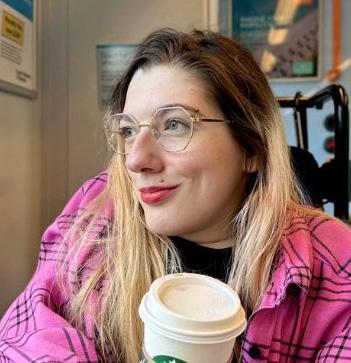
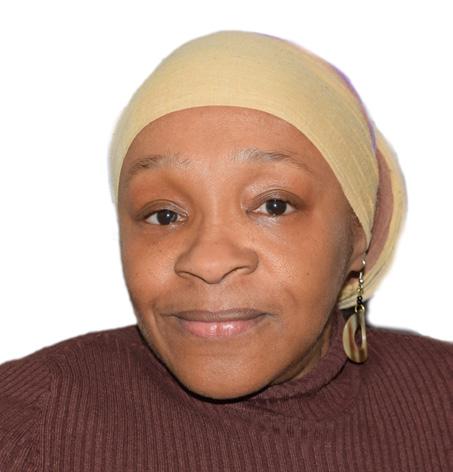
 By Melody Powell (She/They) and Michelle Daley
By Melody Powell (She/They) and Michelle Daley
Ofsted states on the GOV.UK website that their aim is “to improve lives by raising standards in education”. However, when it comes to accessibility and inclusion, it seems that these raised standards can be more detrimental to pupils’ lives. For example, highly rated schools often have the bare minimum for Disabled students, as they focus on ticking all the inspection framework boxes rather than considering individual students’ needs as a stand-alone priority.
Melody says:
"In my experience within mainstream secondary education, the local school I started at had an ‘outstanding’ rating from Ofsted; however, my time there was far from outstanding. I only ever had trouble when it came to getting any of my needs met, and it seemed the school couldn’t understand why what they had to offer wasn’t enough for me."
"So, after fighting a losing battle, I moved to a different school. This one had a bad reputation

20
Policy
Ofsted emphasis on ‘improving’ school standards undermines inclusion.
in relation to Ofsted reviews; they were seen as a school full of badly behaved pupils, as they often took students that other schools had let down. Despite how this school was perceived, we felt they were worth trying because of our positive experience talking with the teachers and assistants. I’m so glad we didn’t judge them purely on their Ofsted rating. They were the most supportive and understanding school; they helped me and many other Young Disabled people to achieve our potential as they were always willing to adapt to our needs." (Melody Powell)

Melody’s argument is backed up by ALLFIE’s own campaign for inclusive education, for example, work around attainment and government league tables, which show that Disabled people are being punished by the impact of targets around achievements and performance tables: “The government’s league tables support educational inequality, but also helps to maintain the social-economic gap within society. There is huge pressure on schools to aspire to be at the top of the league table. This encourages schools to not take Disabled children (with or without labels) and other children labelled as disadvantaged. It also encourages schools to compete against each other, but at the harm of all children and society.” (Michelle Daley, ALLFIE Director, virtual lecture to Japan-UK Inclusive Education Seminar at Nayoro City University 2022)

In 2019, the Independent newspaper reported that “Government league tables “punish” schools by ignoring pupils’ backgrounds” (Eleanor Busby, Independent: January 2019).
Five hundred schools’ positions changed on the league table “once pupil ethnicity, deprivation and special needs were taken into account, researchers found… 40 per cent of schools currently judged to be underperforming would no longer fall into this category if these factors
were considered.” (Eleanor Busby, Independent: January 2019)
Schools that practice inclusive education in mainstream provisions, where diversity and belonging is nurtured, ensuring the whole school can thrive, are being punished and labelled as ‘under-performing’ because they do not discriminate in their intake based on characteristics and social background. Ofsted league tables contribute to increasing social class difference, ableism and other forms of discrimination in school intake by creating a value system. The discriminatory and unjust league tables publish information that reinforces structural, systemic inequality, and divided communities.
21 Policy
“
In my experience within mainstream secondary education, the local school I started at had an ‘outstanding’ rating from Ofsted; however, my time there was far from outstanding"
Melody Powell
Intersectional approaches to inclusive education under UN Convention on the Rights of Persons with Disabilities
 By Maresa MacKeith and Michelle Daley, ALLFIE Director
By Maresa MacKeith and Michelle Daley, ALLFIE Director
Introduction
The United Nations Convention on the Rights of Persons with Disabilities (UNCRPD) Article 24 on Education, talks about the importance of having the right support in school:
“In realizing this right, States Parties shall ensure that: Effective individualized support measures are provided in environments that maximize academic and social development, consistent with the goal of full inclusion” (UNCRPD Article 24 on Education, Paragraph 2e).
Maresa MacKeith refers to the realisation of Article 24 in practice, through her own school experience and the type of support she had. Maresa’s experience demonstrates the importance of understanding the UNCRPD from an intersectional persective, to influence policy and practice and ensure that we move towards inclusive education and achieve social justice and human rights for all Disabled people, in all areas of our lives.
Supporting Maresa to achieve inclusive education, it was necessary to recognise her rights as a Disabled child (under UNCRPD Article 7 on Children With Disabilities), respecting her gender as a girl (under UNCRPD Article 6 on Women With Disabilities), as well as her rights to independent living to make choices and be in
control of her own support (under UNCRPD Article 19 on Living Independently And Being Included In The Community). This illustrates that inclusive education cannot be achieved in isolation or by homogenising Disabled people’s experience and background.
Maresa’s experience
When I was finally accepted into a mainstream school, I was so excited. I was eleven and had been at my special school since I was five. My special school did not believe in my communication system, so I was not receiving much that was appropriate for my age. I had had two years of one day a week in a primary school which I enjoyed, made friends and learned a lot but because it was only one day a week, I could not keep up. So, to be accepted to go full time to a mainstream school seemed wonderful.
Unfortunately, the SENCO at the new school did not believe in my communication system either. Her attitude was that if she did not know about it, it was not worth knowing about. She wouldn’t let anybody teach the assistants.
It seemed clear to me that the SENCO did not want me in that school. She did not want to know how I communicated and did not want the assistants at the school to learn about what I could do. I spent a lot of time away from the classrooms, alone with

22 Law
assistants who didn’t know anything about me.
The two years I spent there were awful although some of the young people did try to make friends with me. I felt isolated and hopeless.
I then had a few months at home recovering from an operation. I eventually got a teacher at home who said she would find a school for me.
The attitude of the next school was completely different. They acknowledged what they did not know and asked for our help. We taught them the skills needed to assist me and were involved in the recruitment of my assistants. They were excited about learning new skills and ways of including me.

The two years I spent there opened up worlds for me. Time was given for the young people to learn my communication system and time was given to encourage the young people to get to know me.

This school gave me the confidence to go on to Further Education College and then to university. I learned so much and I still have a friend from that school over 20 years later.
Conclusion
Maresa’s experience highlights an example of what the UNCRPD is calling for, and the reasons why we need Article 24 implemented in our domestic law, to achieve inclusive education as a right for all within mainstream education in the UK. Inclusive education within mainstream educational provisions shouldn’t be an isolated experience, it should be the norm.
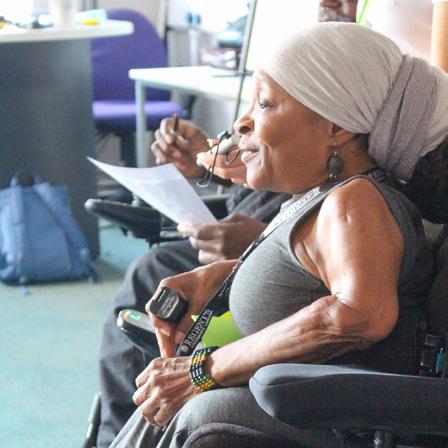
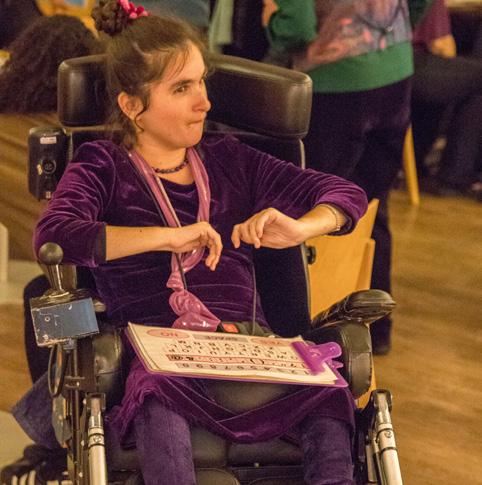
23 Law
Image: Maresa MacKeith and Michelle Daley, article authors
Disability history month
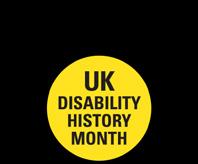

EXPLORATION 2023
UK Disability History Month has launched a creative initiative aimed at Young Disabled people in the UK. Richard Rieser explains how to get involved.
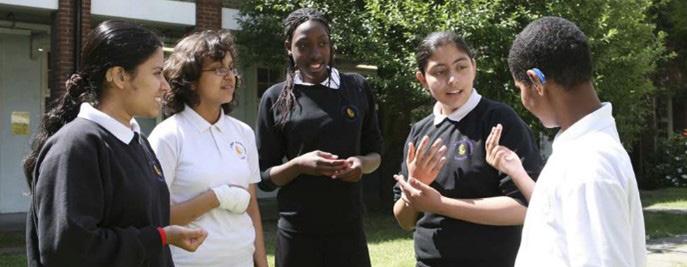
UK Disability History Month (UKDHM) are asking Young Disabled people to share their experiences, whatever school or college they attend/attended. UKDHM 2023 will explore how Young Disabled people have been treated in the past and currently to help shape our ideas of how we should be treated and valued in the future. As part of a new exploration, we want the good, the bad and the changes they would like to see. If you are a Young Disabled person, a parent or work with Young Disabled people, please encourage them to take part in Exploration 2023
The theme of United Kingdom Disability History Month in 2023 is ‘Disability, Childhood and Youth.’ As 2023 is the Commonwealth Year of Youth, it is a fitting time to examine how Young Disabled people are experiencing life. With the disability rights of the Equality Act, protection from discrimination, harassment and the right to reasonable adjustments, things should have improved. The signing (2007) and ratification (2009) of the United Nations Convention on the Rights of Persons with Disabilities by our government, should have led to a paradigm shift in the UK, from the medical model/ deficit thinking to a social/human rights-based model of empowerment and equality.
In reality, the goal of inclusive education and equality appears further away. There is a large increase in segregated provision; bullying and hate crime towards Disabled people continues to increase. Intolerance of physical and mental difference by a minority remains high, as financial and economic difficulties lead to more political scapegoating. However, there are also thousands of examples where ordinary people’s humanity challenges prejudice and breaks down barriers to promote acceptance and to value difference.
Submitting an entry
Entries can take any creative form, including poetry, prose, artwork, film (MP4 file) and signing, and will be judged in four age groups (from under 8 years, 8 to 12 years, 12 to 16 years and 16 to 25 years). Whatever your type or degree of impairment, please enter. Submissions can be by an individual or a group. Details, resources to develop thinking from a social/human rights point of view and an application can be found on the UKDHM website. The thinking in entries needs to be from the young people themselves.
The panel of judges include: Mike Rosen, Colleen Johnson (NEU Executive), Yewande Akintelu-Omoniyi (ALLFIE), Disability campaigners and teachers.
Entries must be submitted with an application form and an electronic high-resolution version of their entry to susie@ ukdhm.org by Tuesday 31st October.

24
Myson was recently permanently excluded from school, after five months of fixed-term exclusions. This followed a fight with another pupil, who was not excluded in any way. My son has been formally diagnosed with dyslexia and, recently, ADHD. I’ve been asking for an Education, Health and Care plan for 12 months, which the school have not acted on. I’ve also appealed against the permanent exclusion, which the head teacher has now reversed. I have evidence the school fabricated and falsified information (including my signature agreeing to my son attending an Alternative Provision!), to suit their reasons for my son’s permanent exclusion. During a further three weeks waiting for his reinstatement, the school have ignored my emails. In total my son has been without any education whatsoever for 4 months, and the school have done nothing to re-integrate him. They’ve now offered a vocational college placement for 3 days a week, saying nothing about the remaining 2 days. What is my legal position?
I am sorry to hear that your son has faced such an extensive period of exclusion from school. If you asked the governors of the school to review the decision, then the governing board is required to set out its reasons for reversing the permanent exclusion in sufficient detail, so that all parties can understand why the decision was made. However, a head can reverse their own decision before this stage. If they do so, then they don’t need to give reasons.
When a child of compulsory school age (5 – 16) is suspended from school for more than five school days, the governors of the school must arrange suitable full-time education from the sixth day of the suspension. If a child receives multiple suspensions in a row, the days of the suspension will accumulate for the purposes of this duty. For permanent exclusions, it becomes the responsibility of the Local Authority rather than the school to arrange suitable full-time education. The school are now offering a placement which does not amount to full-time education. If your child is of compulsory school age, then the Local Authority, rather than the school has a duty under section 19 of the Education Act 1996 to ensure that he is provided with suitable full-time education. That education could be in an alternative school or otherwise, depending on what is in the best interests of the child. The legal route of challenge in this scenario is judicial review, which is a way to challenge an unlawful decision by a public body. You should seek legal advice on this. Legal aid can be available in the child’s name in cases of this nature. Judicial Review is only appropriate for failures which are ongoing. They will not address past failings.
In relation to the school falsifying information, in our experience unfortunately it is unlikely that the courts would be willing to consider the issue.
It may be a good idea to make a complaint to Ofsted regarding the general conduct of the school, including the fact that they have kept incorrect personal data about you and your son. The Information Commissioner may also investigate if you report the issues to them. The Information Commissioner would expect you to exhaust the school’s own complaints process first before reporting the matter to them.
With regard to whether a Local Authority can or should be intervening in a school complaint, this depends on the type of school but also the nature of the complaint. If the school is maintained by the Local Authority, then the complaint will escalate to them if not resolved at school level. This is not the case for an Academy school, and you would generally only expect the Local Authority to be involved if the complaint concerned safeguarding.

In relation to EHCPs, a parent is allowed to directly make a request to the Local Authority to carry out an Education, Health and Care needs assessment. This is for the Local Authority to determine whether the child or young person needs an EHCP. It is very disappointing that the school has not cooperated with this, however, we would recommend that you approach the Local Authority directly to request the assessment as it is not within the school’s power to ‘refuse’ the request. Looking at your situation, we would suggest that your efforts are likely to be better spent trying to secure an EHCP with the Local Authority than with the school at this stage.
This Legal Question was posed by Navin Kikabhai and answered by Victoria Higgins, Simpson Millar Solicitors


25 Legal Question
The Alliance for Inclusive Education (ALLFIE)


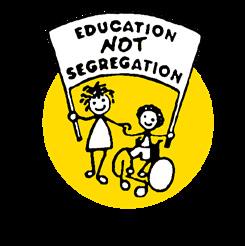
A national campaigning organisation led by disabled people. ALLFIE works to change laws, practices and procedures which discriminate against Disabled Young people and prevent inclusion. ALLFIE works together with allies to build a social climate in which everyone has a valued place.
336 Brixton Road, London SW9 7AA
Tel: 020 7737 6030
Email: info@allfie.org.uk
Website: www.allfie.org.uk
In collaboration with:
Inclusive Solutions
A team of psychologists and associates who specialise in cutting edge practical strategies and ideas for developing effective inclusion in local mainstream schools and communities. We work with anyone who wants to bring about the real systems changes that are necessary to move towards a truly inclusive society.
Tel: 0115 9556045 or 01473 437590
Email: inclusive.solutions@me.com
Website: inclusive-solutions.com
World of Inclusion
A consultancy that provides advice, resources and training in the UK and around the world to develop equality for disabled people especially in education. Richard Rieser is an expert disabled international equality trainer, consultant, film maker and writer and teacher.
Basement, 78 Mildmay Grove South, London N1 4PJ
Tel: 020 7359 2855 or 07715 420727
Email: rlrieser@gmail.com
Website: worldofinclusion.com
DISABLED PEOPLE, PARENTS AND ALLIES, WORKING TOGETHER
to educate, facilitate and empower everyone who wants to be part of the growing inclusion movement. Together we want to bring down the barriers so all young people can learn, make friends and have a voice in ordinary school and throughout life. For each and every young person, this is an essential human right.
This magazine is published by:
ALL MEANS ALL








































